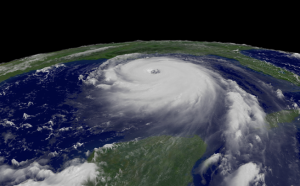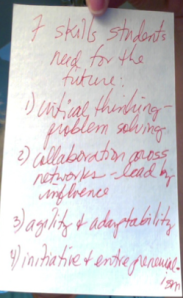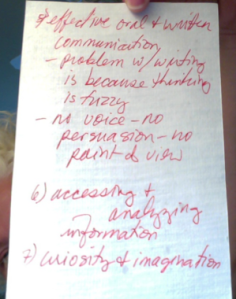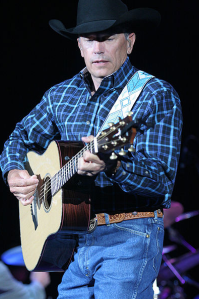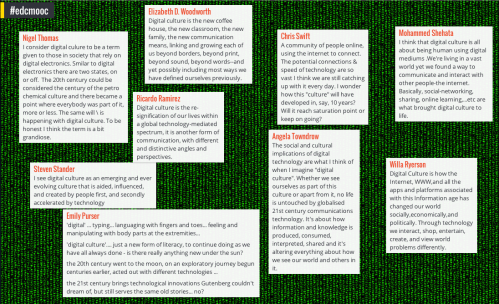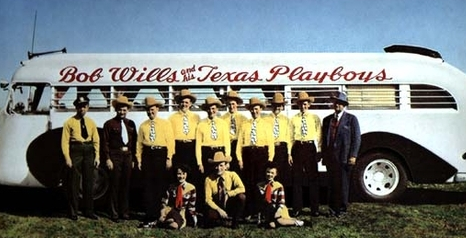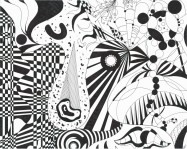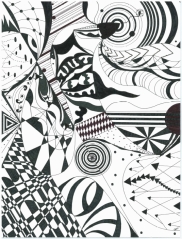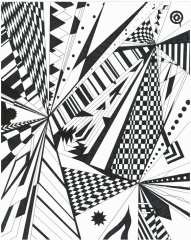I’m finally admitting I don’t want to write here at the moment. It’s been coming for a long time–for over a year. But I didn’t want to admit it because, of all the blogs I’ve created and been devoted to, this is the one I love the most, the best, that means the most to me. But I have to let it alone for awhile. I need to get to teaching new classes and being a new person–professionally and personally (I have new responsibilities at work, and decided I’d like to have a life, too). Farewell, beloved blog. I’ll miss you, but I’ll be back some day. Hasta la vista, baby.
MOOCing for my students… as it turns out
The MOOC I’m in at the moment, E-Learning and Digital Cultures, has had an impact on my freshman composition class. I wasn’t expecting that. I sort of kind of really believed that the MOOC and my students were two separate entities.
In the interest of remembering this first MOOC experience and the way it connects to my teaching, I want to record some of the things I “discovered” in this first week and how this translated to my freshman class. (Who woulda thunk this could happen? But it did. And it seemed so natural and easy and right.)
After week one in the MOOC, I found these things:
- 40,000 people is too many for me–my semi-loathing of huge crowds in physical space translates to online. It gives me the willies to even think about getting into Twitter with 1,000s of people involved.
- The same for Facebook. Now that there are over 4,600 members of our group, I’m freaked out a bit. I like what everyone is doing–helping each other and being thoughtful–but it’s too big. Or I’m a big ol’ chicken and I need to get over myself. (It’s probably that last.)
- I love what happened pre-course and am so happy I set myself up to learn as I wanted to–with a small group of amazing thinkers, that is:
- Quad-blogging as we’ve adapted it. Early on someone introduced this concept and we adapted it for this experience–having picked a group of 4 or so bloggers to connect with through the course.
- Now we have done the Google+ Hangout twice (once with three of the four, once with two of the four–recorded!) with plans to do it again each week of the course.
- I’m very happy to feel connected to these brilliant people.
- Four is a very fine number. It’s .01 percent of 40,000. Nice.
- I love the decentralized feel of the course–no talking heads to direct me too much. I thought there would be more teacherly guidance. But I like this free-form learning. I like the incredibly low-stress learning environment.
- I even don’t care that I’m not totally getting everything the professors might have intended for me to “get”–I’m doing this for me: to learn more about how MOOCs work, to play with and learn more about digital tools for teaching, and to see what happens.
- I enjoyed the videos and readings (though the one article from 2001 is ancient by digital standards).
And this is where the overlap to my own teaching has happened–in doing the actual work of the course. As I watched the videos, I thought: we’re talking about this very thing in my freshman comp class. We are only creating digital/online writing the whole year (and honors comp sequence that runs through both fall and spring semesters). We are focused on public memory, memorials, and monuments (this spring in Montgomery, AL and New York City), but everything we do is online–we are connected at the hip to the machine. OH MY WORD. So I did this:
- We watched Bendito Machine III and then The Machine is Us/ing Us.
- I asked the students to particularly pay attention to connections between the two.
- After some discussion we re-watched them (they’re short), and then talked about subtleties we missed the first time around.
- THEN we talked some more about how we are training ourselves AND the machines in various ways… and student said something that triggered our watching of Eli Pariser’s TED talk on filter bubbles. It was just so appropriate that the “machine” is also being trained by algorithms of some kind or another that give us specific information tailored to our searches, but also by what the machine learns about us regarding our choices, our location, our socioeconomic status perhaps. Who knows? Google could be sending us different search results based on our shoe size for all I know.
- Students learning about information literacy and writing online must be also thinking about what that MEANS not just how to do it.
- Having a larger context for this sort of existence online is crucial, but I hadn’t thought of putting it in terms that these short films did, and frankly, I wouldn’t have come up with this combination alone. I needed the “crowd-sourcing” of this MOOC to help me think in this way.
- The students were terrific about this unexpected twist in our learning–they always are. I thank my lucky stars that I’m blessed with the best of the best in disposition and determination to learn and think and keep blowing up the box (we don’t even think outside the box–when we encounter a box, we blast it to smithereens).
- Next class period, we might watch the other films and another TED talk and think more about our digital culture that we’re creating. NEVER dreamed that the crossover from MOOC to comp classroom might work so well.
But, then, I am a firm believer in Serendipity and let it wash over and wave (crashing sometimes) through my life at will. It’s my way. Frank Sinatra has his way, or rather “My Way“–I have mine. And I don’t think I could be happier doing it differently. Actually, my way looks and sounds just a bit more like this: Judas Priest’s “You Got Another Thing Coming.” If it weren’t for my semi-loathing of huge crowds, I’d have said my way looks exactly like this, in a stadium with 80,000 MOOCers, I mean, rock and rollers:
Filed under MOOC Journeys, Survival and Success, Writing is Beautiful
Might could be the case I’m into controlled chaos
In the American South, I have learned to say “might could” in a situation that is uncertain. And it might could be that I’ve put myself into a situation, the outcome of which is most certainly uncertain.
I’m taking a MOOC right now (E-learning and Digital Culture) and signed up for one after this (can’t even remember, but I know they’ll send me an email).
Then I signed up for another MOOC that I swore began May 18. I was so excited–that would have been after my spring term ended and just as summer began–perfect timing. I’d be finished with my spring MOOCs and starting my summer teaching (only one class this summer!). But not so. It starts March 18–smack into the middle of my spring term and not something I will be able to work into my routine in a reasonable way.
So. I’ll be unreasonable. I want to take this in a big way: a composition MOOC, “Composition 1: Achieving Expertise.” I’m just going to do it to the best of my ability. I’ll engage as I am with my current MOOC and invest early.
I’m dying to see how composition will be handled on such a large scale and how it might accommodate thousands of students and their writing. I know it’s going to be a terrific experience, because how could it be otherwise if I’m learning something? The instructor is an acquaintance, and I respect her thinking deeply. In fact, it was her article on performance and observation of writing instructors from a year or two ago that is changing the way I do that part of my job.
I know there are MOOCers who take a lot of classes at once, so I know I can do this. Partly, I know this because: 1) it’s free; 2) I don’t have to complete the thing. In fact, I may not have to do much work at all to get a lot from it. It’s not like I’m taking the course for freshman comp. I took freshman comp already (got a C and a B in Comp 1&2, respectively). What I wonder is this: if such a course as this one might have made a huge difference in my writing life when I was starting college. I was a lousy writer, not because I was bad but because I’d had almost no training of any kind. Writing to me, upon high school graduation, was a mystery that only a few could figure out, or it was a gift that even fewer were given. Writing well was NOT something I could learn to do. In fact, these ideas were reinforced at nearly every step of my educational life.
I wasn’t taught to work on making my thinking clear then correcting for errors. I was encouraged to write it perfect the first time. Perfect. Oh. No pressure. Multiple drafts? What? Never. Multiple drafts were for the weak. We wrote and turned in what we wrote, all first drafts: good, bad or horrific. Spelling mattered right away–in the first and only drafts–and so did penmanship. I actually had a penmanship tutor for a whole school year because I was so lame at handwriting. (I did get to the point where I could write gorgeous cursive–but my “writing” was still crap.)
I was stunned when I finally learned the secrets of writing well (far into my college career): 1) writing can be learned; 2) thinking is more important than correct comma usage; 3) writing takes practice; 4) multiple drafts can be really deeply profoundly madly important; 5) proofreading can be learned and should be done last; 6) writing is collaborative; 7) writers need mentors (human mentors or mentor texts); 8) writers need to know the genres they are trying to write; 9) writers need to read a lot; and 10) writing is revision. This is not all I know about writing now, but MAN, if only I’d known about some of these sorts of things when I was younger.
Now, I try to teach writers these ideas (and more) by allowing a lot of freedom in the classroom. “Just write,” I say. I hope I haven’t swung too far the other way from: “Just write perfectly.” But I consider this chance I have to take a freshman comp class in my PJs for no cost but my time a wonder. Holy composition & rhetoric. What an opportunity. I can see what a colleague in my field is doing–get ideas, share my learning with my fellow students, and maybe even learn more about how to be a better writer. I know I do things in my blogging that might be confusing, so perhaps I need to learn something new/old to help. Why not? (Things I think I do as a writer, or habits, or tics I’m sure I have or suffer from: I write a lot of first drafts and don’t always revise–OMG–yes, I just said that; I overuse fragments by writing in phrases rather than independent clauses; I tend to write like I talk–totally; I think I abuse semi-colons; I write/type fast and make more typos than I care to admit; I will use a single word to make a statement. Nice. Right. Showoff.; I ramble around a topic and sometimes don’t always occasionally once-in-a-while frequently end up wrapping the whole thing up in a tidy bow at the end; I fool around a lot pretending to be a whole lot better than I am by using a $20 word when a $5 word might do (what a brat, right?); I’m pretty self-indulgent, too.
As a writer, I might could use some sustained thinking about writing and being a writer and achieving expertise. What is that anyway? Expertise? It might could be that I could polish off some of my expertise trophies I have shoved onto my shelves and left alone for too long.
I have nothing to lose but time. And really, that’s the only gift I have that I can’t get more of. I’d like to use my time in a positively, forward-movement, open kind of way. Life-long learning–it’s been hip to me since 1990 and a personal philosophy.
So what if my life is chaos? I’ve been called a hurricane and a whirlwind. Okay. I’m down with that. But surely I have some control over when I create or participate in the stormy chaos. Or do I only wish I was in charge of me? Wouldn’t it be great if I was actually making forward progress while storming through life? Might could be the case.
In April, there’s a Writing II class that begins. Taking that would just be adding to the storm, the chaos, the madness. Nope. I’m not going to sign up for it. No way. Not gonna happen. Ain’t my thing. Can’t do it. Never. Shoot. Might could be I’m already signed up.
[Image source: here.]
What did I just say? I can’t remember but WordPress will
The EDC MOOC begins in just under a week. Various sites have been abuzz: Facebook, Twitter, Google+. I’m impressed and inspired. Today, I spent a couple of hours playing around with Google+. I’ve been an active FB user. I’ve not been a very active Tweeter. I find I love book for education: I FB message my students updates and suggestions for reading and heads-up notices for what’s coming next. It’s easier than using our university email–really. I get to them immediately and I immediately see if they got my messages. I like to use Twitter in class for students to share responses to a discussion, presentation, video. I forget to use it sometimes, but it’s been such a great tool for memory. Search for the class hash tag to find everyone’s summary of learning for the day–that’s learning like a boss. I also love to have students take pictures of what we write on the board. Sometimes I write a lot, sometimes they write everything. But we need evidence. And we need to post that on FB or through Twitter or on our blogs. Memory is vital to learning–but how much room do we really have in our brains at any one time?
I can’t remember what I’ve said from one day to the next (I guess this is what Plato feared would happen when we all started writing everything down–or I vaguely remember something like that from classical rhetoric class). How do I deal with my memory being sometimes lame? I write notes in my iPhone. I write blogs to remind me what I said was due (hoping it’s not too far from the original syllabus!). I record voice memos to remind me of points I think are important, things I must due, projects that are due, reports I have to write. I used to call my home answering machine (or my work voice mail) and leave myself reminders. That was the only way I could do it other than writing with ink on paper. Now I have options.
I still use ink on paper, but I tend to lose those notes–I’ll never give up doing it–that kind of physicality triggers a different kind of remembering for me, but the phone is great. And I have never misplaced my phone. Like my keys and sunglasses–never lost a one of these things. Never. (I know–knocking on wood right now.)
So, for students who are social media savvy (at least), here is a way to remember what’s happened–pick your way of remembering–use the digital online “sticky note” of your choice. By linking all the students together through several media, though, we stand a better chance of actually learning from one another. Like the old school taking of notes with pencil on notebook paper, it’s a crap shoot if they actually take advantage of the technology to learn. But I can try, can’t I?
The two images I’m including in this blog post are from notes I took today while watching a video posted in Google+ by a student enrolled in the EDC MOOC community. Tony Wagner is the speaker in the video–he talks about what students need to learn in order to be successful–not content but skills. I cannot find a single thing wrong with this list. I took handwritten notes because that was handy (left my dongle at the office for my dual screen, so I’m stuck with my laptop only–such a first world problem). I didn’t feel like working on my iPhone or my iPad. I didn’t want to hunt and peck for letters, but actually write out what I was hearing. I could actually go to the web and cut and paste his seven points–there are lots of locations where these could be found, but I liked writing today. It felt good.
Mainly, it felt great to hand write notes because I haven’t done it much lately (I’m regularly without a pen in public), and I find it sort of makes me think differently–engages a different part of my brain, I guess–like it’s important to lift weights with your arms AND legs so your body doesn’t get oddly proportioned!
Notice: number 5–obviously going to be my favorite. Wagner says students need “effective oral and written communication.” Yup. If I was a cowboy, I’d say, “Damn straight.” Every set of learning objectives I’ve ever run across lists this as crucial. Is it not the case that fuzzy writing is emblematic of fuzzy thinking, that lack of voice leads to boring prose (and loss of reader interest), that persuasion and point of view are too infrequently managed well and with grace. I get it. I teach writing. I am a writer. I am also a writing consultant. I see it all, from basic writers to grad students to senior civilian and military global leaders–brilliance must be articulated and communicated to truly be brilliance. Innovation and creativity? Not going anywhere without articulation and communication. Want to be a leader? Good luck if you can’t say what you need to say to the right audience in the right way. Want to capture and keep a reader’s attention? You’re not going to do it with painfully dull prose littered with jargon and acronyms. For a MOOC learner, I think number 5 must be the most important point–mostly what we have is writing, some oral communication (Google+ Hang Out–which I’m trying tomorrow)–but a LOT of written communication. I’m betting the farm that MOOCers who are successful, have most of these seven skills. They are motivated and savvy learners already, or they have what it takes to get that way in a hurry.
For instance: I didn’t want to learn Google+ because I’m busy. It’s the first couple of weeks of the term, and I have had a lot to do. I am overwhelmed by paperwork, class work, my own work, publishing, innovating, etc.–all the things teachers and administrators do at the beginning of a semester. I whined online that I didn’t have room for one more thing in my brain. I couldn’t learn one more thing. (And if I forget I said that, I have an archive of my complaining. Great.). But my blog group for the EDC MOOC is going to Hang Out tomorrow on Google+. Today, then I decided I’d spend some time learning. And it’s not hard. I was just too scattered to handle it. BUT here’s what I knew would save me: the internet. I just “Googled” how to use Google+. There are tons of videos online. I watched a few. Done.
I did the same thing when I needed to learn WordPress–I watched a few videos then dove in. Nothing is impossible. Or it feels that way. The only constraint for me is time now. And do I need to remember everything about how to FB, Tweet, Google+ or WordPress? No. The internet is not only a repository for information, it is my memory, too. I know. It’s risky. What if all this cyber existence ceases because of an apocalyptic event? So what. We’ll have a few hearty folk who will survive and pass on the few books that make it. I have total hope for the preservation of humanity–perhaps not all humanity, but some, surely will get past a meteoric collision.
The point is that our students don’t need to remember everything anymore. But they still need to think. They need to be able to use everything they can find out there in the very big and wide world in positive ways that will enhance the conditions in which they can acquire these skills and increase their ability to acquire these skills (thanks, Tony Wagner):
1. Problem-solving and critical thinking;
2. Collaboration across networks and leading by influence;
3. Agility and adaptability;
4. Initiative and entrepreneurship;
5. Effective written and oral communication;
6. Accessing and analyzing information; and
7. Curiosity and imagination.
It ain’t easy–that’s for sure. Just look at the MOOCers who have been most active. No slackers here. No one asking others to learn for them or spoon feed them the content. Did they get that way in the last two months. Not likely. Chances are they came to this MOOC with the desire to learn, so that’s what they have been doing, in order to get ready to learn in the course. “Overachievers,” one could mutter and dismiss it at that. But there’s more to it, I think. There really isn’t any content to learn when the class hasn’t even started. But there is a condition which now exists, which everyone has created, in which we can truly “get” and use all seven of these skills to be better learners, better workers, better employers, better citizens, better people.
We are peer teaching ourselves what we know about e-learning and digital culture–we created the content, and we are making it possible to do more than any one of us could do alone. I’ve learned more from my peers’ posts than I could have in a traditional f2f class in this amount of time–even with an expert leading the way–because the knowledge they’ve shared is vastly different from vastly different perspectives. We are all teachers and learners at this point. Would all students do that–be this active? No. And not all of the EDC MOOCers will either. Some will fade, just like in any educational situation. We are all capable of self-failing. But we are also capable of so much more. It’s like watching a perfectly timed rock concert to see how everyone is working together BEFORE the class has even begun. The Beatles after 10,000 hours of performing. Inspiration times infinity.
In the meantime, I have to transition to getting ready for my coming week at school. I have to let this thinking go. Wait. Wait. How will I remember what I was doing? What I was thinking? What did I just say? Check my Facebook status if you want to know. Read my blog. Check my Twitter. Find me on Google+. I love that I don’t have to remember any of this post. It will all be here for me tomorrow to check (perhaps, to my everlasting shame I will have said something idiotic, or committed the heinous of all errors: the typo; I know I will have included several fragments; they bubble up or burst into my writing like hot, boiling sulfurous geysers from the bowels of the planet–oh well, no pain, no gain).
And when I despair that education is sliding down a slippery slope into intellectual chaos because of all our online shenanigans–Johnny can’t Read/Johnny Can’t Write because [fill in the latest literacy depleting demon]–I remember that all of this work I’m doing online, writing, reading, posting, updating my status (and the work that I’m making my students do) is sometimes actually based on thinking. OH MAN. How cool is that? I totally don’t care what Plato might think.
Filed under MOOC Journeys, Writing and Identity, Writing with Heart
25 minutes to heaven
The Los Lonely Boys ask: “how far is heaven”? in their song: “Heaven.”
I say: 25 minutes. Heaven is 25 minutes from right here. That’s when my first class for the Spring 2013 starts. I love being a teacher. For me, teaching is heaven.
Today, we’re going to talk about storytelling and memory and place. And this spring term will utterly rock. It always does.
Filed under Heaven, Teach This, What I'm Thinking, Wholehearted Pedagogy, Writing is Beautiful
Oh, George, you took the words right out of my mouth
I went to see George Strait in concert many, many years ago in Boise, Idaho. It was the mid- or late 1980s. He was (and still is) lovely, and he can sing so beautifully, so perfectly country. The concert was wonderful. And I fell asleep. He stood on the stage with his band at his back, white cowboy hat on his head, and played the guitar while he crooned. And I nodded off.
That’s not to say I don’t adore him still. I do. I just recently discovered a CD of his hits and loaded it onto iTunes, then saved a few on my “Bring It On 2013” playlist. I’m listening to him croon right this minute (he looks good in a black hat, too). “You’re Something Special to Me” is playing as I begin writing here. George and this song have got to be the equivalent of Frank Sinatra singing when he was younger, like this with Tommy Dorsey, “I’ll Never Smile Again.” Can’t you just see the women swooning for both/either? I can.
In fact, as I started thinking along these lines, heaven help me, I recalled a Looney Tunes cartoon where a Bing Crosby-like rooster and a Frank Sinatra-esque rooster sing to help the chickens lay more eggs for the WWII effort. It is called, I swear: “Swooner Crooner.” If you ever have a chance to watch it, dear reader, you’ll see how I feel about George Strait (except for the egg laying bit–that’s just, ahem, gross).
I’m so sad I fell asleep during his concert, but he lulled me. JUST like he’s doing right now. I am being lulled this instant. I just want to curl up into his voice and remember how good I have it–how grand and filled with joy my life is–because it is.
As I approach 2013, this George Strait song reminds me of all the special people I have known and loved and who have loved me, have gifted me with their love. Life is hard, but when love is the thing we remember fills the core of our lives–what ill could bring us down?
I’m just happy I found you again, George, you are something special to me.
I’m mad for MOOCs, or will MOOCs make me mad?
I’ve just re-read “The Year of the MOOC” by Laura Pappano (NY Times online). Besides feeling terribly hip and trendy, I’m so glad I stumbled onto this again after a week or so of vacation. I needed to get my context back for what I’m doing and what goals I need to set for myself. The spring semester is nearly upon me, and it will whack me upside the head in a hurry if I don’t step lively.
Context. It’s starting to come back. I’ll need to re-read Facebook posts and other blogs and get my Twitter self in order soon, but it’s coming back.
One thing I’m doing to get my context groove back is to think about why I’m doing this MOOC thing. Why, oh, why did I think taking on a MOOC was a good idea while teaching two new preps, running a grad writing center, a comp program, revising comp 2 curriculum, planning for a summer basic writing bridge course, writing two articles, and planning for three practicum for teachers for the spring (and planning a class trip to NYC and then a summer abroad class)? Why? Because it’s just 3-5 hours a week for five weeks. And I could learn something vital. I need to learn to be vital actually.
Goal number one was: I hoped to see what all the MOOC fuss was about. I’m intrigued by pedagogy because I’m a teacher, and I want to always try new ways of learning and teaching so that I can bring the max goodness to my own students–whether there are seven or 7,000. And what does that mean anyway to teach a small town’s worth of folks? What does “teach” mean, then if the instructor isn’t all hands-on?
While I wanted to know what MOOCing was all about from a teaching perspective, I’m also a voracious learner, a life-long learner, and my interests vary from the NFL to string theory to Jane Austen to the zombie apocalypse. I hope to never stop being a student. My purpose in the world is to learn and pass that on. It’s an educational Buddha thing–and if I don’t play by those rules, they revoke my educational Buddha card. And that would suck. So I had to be a student in a MOOC. (And artificial intelligence or Python wouldn’t have been good courses for me to try.)
But what do I really want to know from this particular course? I don’t know. That’s right. No clue.
Learning objectives for the credit version of this course are these (or so I believe–if you’re taking the course at U of Edinburgh, EDUA11149):
If you want to see previous credit courses and student work, you can check here. The professor for those credit courses is one of the instructors for the MOOC E-Learning and Digital Cultures that begins January 28, 2013.
These objectives make sense for a credit course. For our MOOC, the instructors suggest that we’ll be doing the following:
On this course, you will be invited to think critically and creatively about e-learning, to try out new ideas in a supportive environment, and to gain fresh perspectives on your own experiences of teaching and learning. The course will begin with a ‘film festival’, in which we’ll view a range of interesting short films and classic clips, and begin discussing how these might relate to the themes emerging from the course readings. We will then move on to a consideration of multimodal literacies and digital media, and you’ll be encouraged to think about visual methods for presenting knowledge and conveying understanding. The final part of the course will involve the creation of your own visual artefact; a pictorial, filmic or graphic representation of any of the themes encountered during the course, and you‘ll have the opportunity to use digital spaces in new ways to present this work.
Okay. I like that. It’s like… not work. It’s like… fun. But then I’m not entirely new to e-learning or digital culture, but what I want to know is what others think. I need to know beyond my own concepts, definitions, and experiences. I need to know beyond what I know. I’m so over myself in that way. Bring on what others think and know. I need that. AND that’s why I need this MOOC.
I feel like Harry Houdini sometimes when I wander into that dangerous place where I think I know something. I feel like I could be all chained up, bound, and tied together, but I’d be able to work my out of that spot through a box submerged in stormy seas, because I really know how to do that in a given situation. But what if I get cocky? Don’t escape artists die who start to believe their own press? I don’t want that. Nobody wants that.
If I’m mad for the MOOC because it will expose me to thousands of ideas from thousands of people, or if I’m mad for the MOOC because it will being me closer to the ideas of a few other people, I’m okay with that. Either way. If I’m mad for the MOOC because it means I have some new way to move past the things that bind me, and give me new ways to escape my own chains, that’s a good thing. But could a MOOC drive me mad?
We’ve already seen that it’s overwhelming to get all connected, and the thing hasn’t even begun. Still it feels manageable by being connected to a few folks, like Houdini with only a few handcuffs on, and by being part of a group who has members willing to answer questions, set up the environment where we learn from each other, and generally act as decent and caring citizens of this new community.
One of the frustrations with MOOCS, Pappano writes in her NY Times article, is that there is so little contact with the instructor(s). Already our cohort has proven that invested individuals will jump in and “teach” as needed, share ideas, give advice, tell what’s what, create a “place” (or a “school”) where we can navigate our own learning experience. We already have blog groups actively writing and reading each others’ posts. Amazing.
If I weren’t totally into learning for the sake of making life exciting and grand and new and wonderful, a MOOC might make me stark-raving mad–because it could be intimidating. Or if I was expecting teacherly attention…I might be sadly disappointed, but the thing that makes me squarely on the side of “I’m mad for MOOCs” (so far) is the peer connections, the peer learning, the peer teaching, the peer guidance.
Sure, we’ll get lectures or directions or activities for the course, but my goals now include whatever I need to do for the class and being part of the peer network I’m smack in–that seems to already be one of the best parts of this adventure.
What will this mean for my goals as a professor/teacher/instructor of freshman through grad students and in professional programs? Not sure yet, but I can tell you this: a MOOC does not have to be a big ol’ open online course with 190,000 students in which students cannot learn because there is not attention for each from the teacher, it can be a course for me, something I do with a few friends, and a chance for all of us to change the way we think and work as humans in the midst of other humans doing the same thing.
Oh wait. We’ve already been e-learning and creating digital culture. Boo-yah.
Now. That said. I do have questions about the relevance for higher education credit, and especially for my field, writing students (actually for literature–I can see some possibilities for a MOOC). And the more I think about MOOCs and writing studies, the more I think there could be some dynamic introductory business handled through a MOOC–perhaps to the good of all who still buy into the lone-supergenius-writer-artist-starving-and-striving-and-drinking in an attic somewhere, suffering endlessly for that genius. Pshaw, I say. Let’s MOOC that myth to death.
In the meantime, I’ll be learning about what a MOOC is and can be from the instructors, by observing how they manage this course, but I’ll also learn from my fellow MOOCers. And the more I MOOC, the more I’ll understand. In the future, when I’m asked about MOOCs, I will be able to suggest how a MOOC might or might not help my school, and I’ll know something other than the definition of the acronym.
Image source: Wikipedia.
Filed under All the Way Open, Epic Win, First Blog Boo-yah, High Five, MOOC Journeys, Writing with Heart
A MOOC graphic: Visual rhetoric rocks

Presented By: Online Colleges
Thanks, Emily, for sharing this link/graphic. Love it. For anyone interested in seeing the original, visit the link above!
Filed under MOOC Journeys
I’m wishing on a wall
Okay. I got this. I’m an andragogical learner, just like my friend Amy said. I knew she was right the minute she said it. I’m an adult learner motivated by things that go way beyond the pedagogical, but I don’t abandon the need to be guided by an expert or peers. I thrive on collaborative learning.
The MOOC is working for me at this point, at least the early investment part of it. I’m picking up what my peers are putting down, and I’m digging it all.
Here is what I’m seeing around me in the MOOC that I’ve decided to invest in as a student: a whole bunch of andragogical learners–adult learners–who are in it to win it. One of the great things about being intensely motivated is that you tend to see others who are doing the same thing, acting the same way, and cluster together with them.
One of the early investors in the MOOC, shared this site with the Facebook group: http://wallwisher.com, asking us to add our thoughts on e-learning and/or digital culture (the topic of our MOOC). Here’s a snapshot of a wall where “wishes” have been posted, a bit hard to read here, but it’s the general idea that I want to share:
This app is called Wallwisher. I’ve played with it twice now. Of course, I have a soundtrack for this app.
I haven’t been able to get that old song by Rose Royce (1978) out of my head: “Wishing on a Star.” But I insert “I’m wishing on a wall” to replace “I’m wishing on a star.” I want to slightly rewrite the lyrics to fit the MOOC experience so far. (The song has been covered by Beyonce, Jay-Z with Gwen Dickey, Seal, and the X Factor for a charity single–all fun.)
If I ignore the general gist of the lyrics, I can get into the message for ed tech, e-learning, and digital culture. Gentle Reader, if you would play along, please, pretend I’m singing to the actual disembodied MOOC (try to take the time to see me with groovy folks on a stage, something old school and fabulous like this). Perhaps the words might be something along these lines:
I’m wishing on a wall
To follow where you call
I’m wishing on a dream
To follow what it means (repeat)And I wish on all the readings that I see
I wish on all the people who really dream
And I’m wishing on the MOOC course praying it’ll come
And I’m wishing on all the learnin’ we’ve ever doneI never thought I’d see
A time when you would be
So far away from home
So far away from me*Just think of all the moments that we’ve spent
I just can’t let you go, for me you were meant
And I really want to learn more, so you know
That in education, you reap what you sow
And so on and so forth, etc.
* So really truly deeply apropos for distance education/e-learning/digital cultures, eh?
You’re with me, right? You’ll never see/hear this song the same again, will you? I hope not.
I’m thinking the lost love that is the focus of the song and the quest to learn are both things we chase after emotionally and sing about. And if we don’t sing about education, then we should. Perhaps we shouldn’t sing about learning at the same time as we are voicing our angst about a lost love, though–that just seems like a mixed message. Unless. Unless we sing about loss AND education, i.e., failing grades. I have a whole semester of Fs in 1982 I could sing about with great feeling. Oh yeah.
Give me a minute, I could come up with lyrics for that.
Filed under MOOC Journeys, Wishing on a Wall
Post while you can
I have had several friends talk to me about the end of the world, or the apocalypse, seen numerous FB posts or news stories, films, all about the end that is scheduled for 21 December 2012. Bunk, I say. But if I’m wrong, you better get thee to a blog and post while you can.
I’m right, though, and here’s why: it’s the bicentenary of Robert Browning and Charles Dickens this year (mentioned this in a previous post), and nothing untoward could possibly happen to mar this year. I do love the hullabaloo surrounding the whole end-of-days thing. Some folks need to have a hobby–and there are worse things to focus on than this. I suppose.

Stars. They fall on Alabama. Stars are supposed to play some key part in the apocalypse. Right. When pigs fly.
I think I’ll just make a play list, gaze at the stars, and plan to do all my holiday shopping at the last minute from Dec. 22 to Dec. 24, like I do every year.
And if some transformative event happens, I will roll with it. I am in favor of transformation. Change is life; as a friend says, “when you’re through changing, you’re through.”
To have fun with my playlist, I think I’ll include all the songs I know that are about change. I think I’ll name the list: “Post-Apocalypse Change Or Die Trying” Playlist (PACODT List). (I should have really saved this post until 22 December, but if I’m wrong and I go down swinging, you, gentle reader, may hunt me down and say: “I told you so; you suck; you were so wrong; welcome to the Dark Side.” Or whatever comes to mind to humiliate me for my hubris.)
Number one on the list has to be Sheryl Crow’s “A Change Would Do You Good.” I think that’s the point of all apocalypse talk–we may be “waiting on the world to change,” but there’s no question that “change is gonna come,” and it will “do you good,” because “the more things change,” the more they stay the same; we all know you’re “going through changes,” so you’ll need to “roll with the changes,” but remember “some things never change,” even if “some people change.” And ch-ch-ch-changes are all about transformations, and before you know it, the apocalypse might “change the world.”
Let’s hope the apocalypse is about fab intellectual transformations that come about through open hearts, open minds, and open educational resources. These are “changes in latitudes, changes in attitudes” that I could really get behind.
The PACODT List: song title, artist.
- A Change Would Do You Good, Sheryl Crow
- Change, Churchill
- Change, Taylor Swift
- Change, Carrie Underwood
- Change, Tracy Chapman
- Change, John Waite
- Changes, 2Pac & Talent (thank goodness someone tossed in an “s”)
- Change, Blind Melon
- Change, Lecrae
- Changes, David Bowie
- Change, Tears for Fears
- Change, T-Pain
- Change, Sean Kingston
- Change, Kim Hyun-a
- Change, Diddy
- Are thinking what I am? Get a damn thesaurus people. I found one online in 6 seconds with over 75 possible OTHER words for “change.”
- Change, Staind
- Change, Black Stone Cherry
- Change, Lloyd Banks
- Change, Kimberley Locke
- Change, Good Charlotte
- Changes, 3 Doors Down
- There are many, many more. Oh have mercy anyway. Let’s change this up a bit and go with more than just “change” as the main title of the song.
- And just in case you notice, the below argue for and against change–depending on whether a job’s been lost, a love lost, or a chance lost. Or in the case of Hank Williams, Jr., he just has an axe to grind about change.
- Waiting on the World to Change, John Mayer
- A Change is Gonna Come, Sam Cooke (this is the first and my favorite, but I must say Seal treats this song with grace; not mad for Al Green’s version, but Otis Redding is very fine with this)
- Going Through Changes, Eminem
- Change My Mind, One Direction
- Don’t Change for Me, Gin Blossoms
- Change the World, Eric Clapton (oh sigh)
- Change Your Mind, Sister Hazel
- Cool Change, Little River Band
- Some People Change, Montgomery Gentry
- Roll with the Changes, REO Speedwagon
- What I Cannot Change, LeAnn Rimes
- We Never Change, Coldplay
- We Can Change, Belinda Carlisle
- Changes in Latitudes, Changes in Attitudes, Jimmy Buffett
- I’d Love to Change the World, Ten Years After
- Don’t Change, INXS
- Never Change, Jay-Z
- Never Gonna Chang, Drive-By Truckers
- See the Changes, Crosby, Stills & Nash
- The More Things Change, Bon Jovi
- Keep the Change, Hank Williams, Jr.
- Some Things Never Change, Sara Evans
- Some People Change, Kenny Chesney
- Am I Ever Gonna Change, Extreme
- I Don’t Want to Change the World, Ozzy Osbourne
- Change It, Stevie Ray Vaughn
- Weekend Sex Change, The Dillinger Escape Plan (I couldn’t leave this one out)
- This Changes Everything, Dead Sara (a little of this)
- That Changes Everything, John Michael Montgomery (and a little of that)
- Money Changes Everything, Cyndi Lauper
- Love Changes Everything, Michael Ball, et al.
- Nothing Ever Changes, Stevie Nicks
- Ain’t No Change, The Be Good Tanyas
- Baby, Don’t Change Your Mind, Gladys Knight and the Pips
- Change or Die, Papa Roach
- Change the World, Joan Jett & the Blackhearts
- Things Change, 50 Cent
- So Many Changes, Dan Fogelberg
- I Wouldn’t Change You if I Could, Ricky Scaggs (thanks, Ricky–I appreciate that)
- What Never Changes, Forevermore
- There’ll Be Some Changes Made from Fosse (Go, Bob Fosse)
- Changes I’ve Been Going Through, Mary J. Blige
- Time Changes Everything, Bob Wills and His Texas Playboys (Johnny Cash rocks this song, too–just in case you’re interested in changing things up just a bit.)
There’s no better place to stop than on this song by Bob Wills and His Texas Playboys, because time does change everything.


